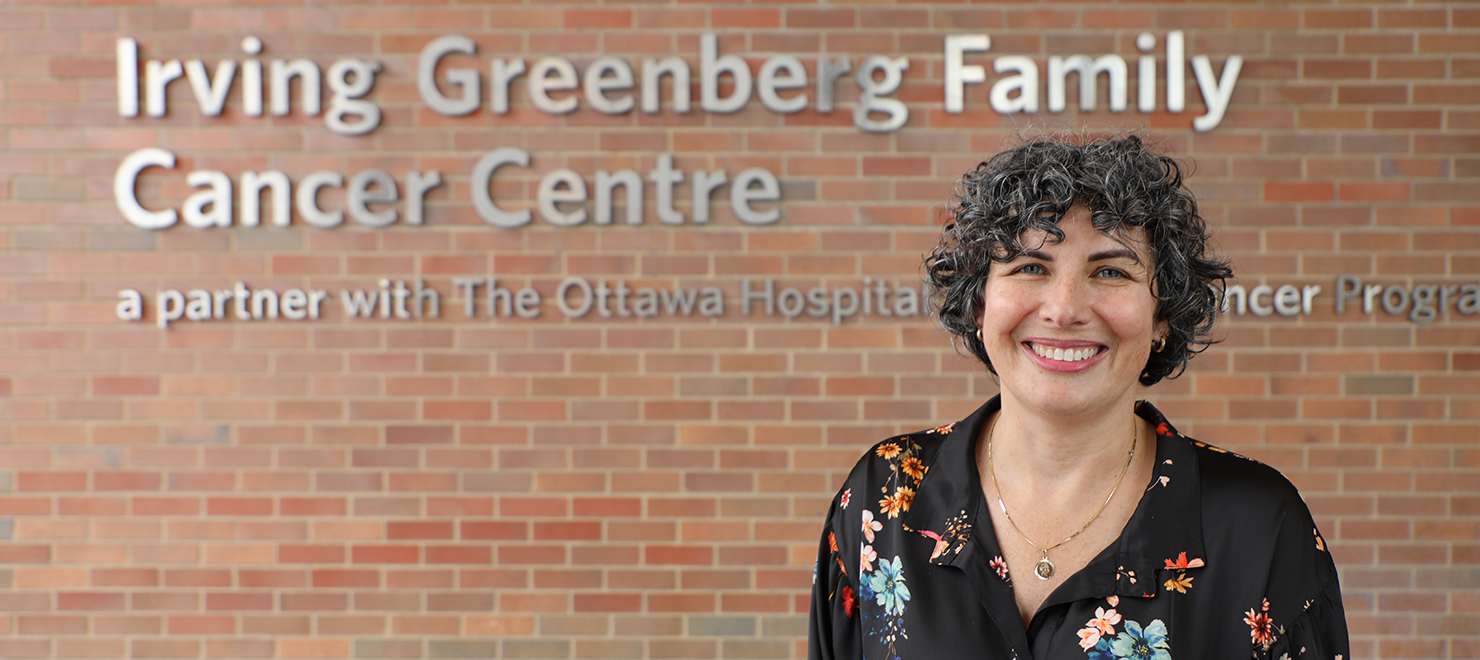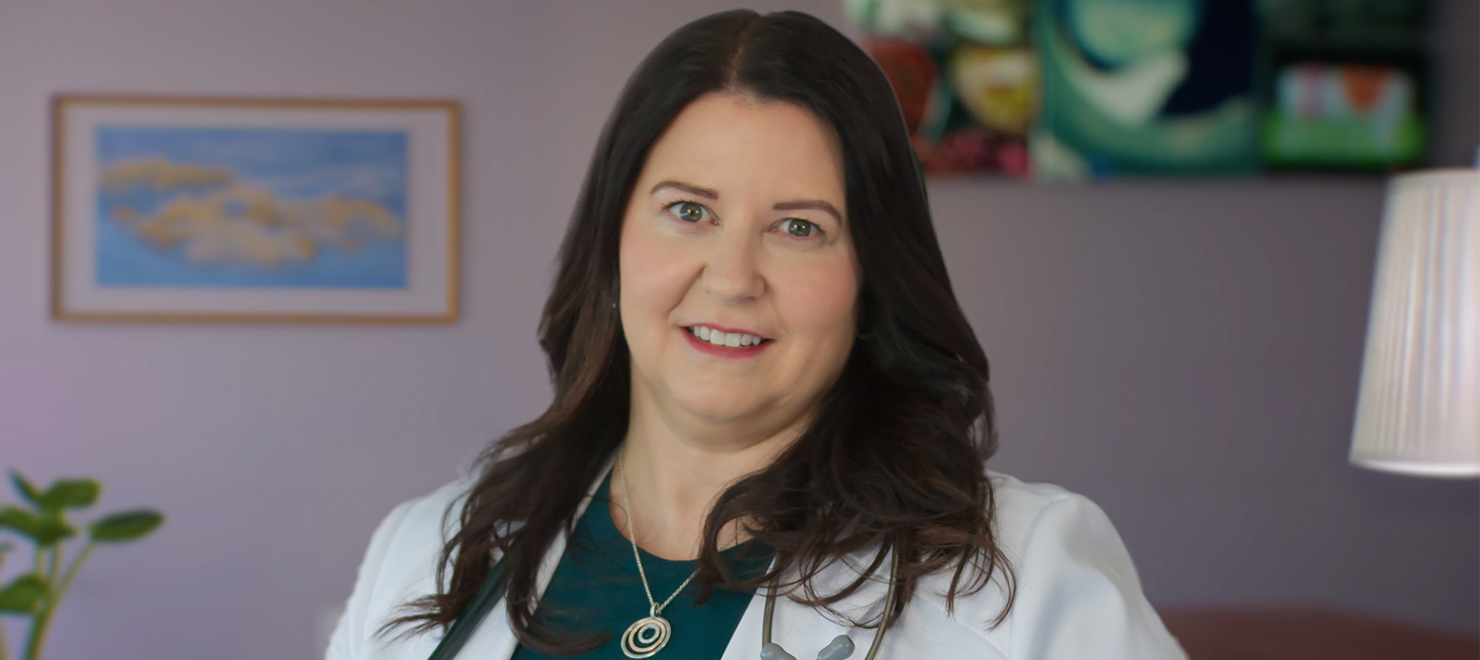
A passionate advocate for cervical cancer screening, Alicia Hilderley is very happy about the new and improved screening test.
“This is a chance for other people to have a different future than mine,” says Alicia Hilderley.
“Five months after my daughter was born, I went to my family physician for a regular visit, and she discovered a tumour on my cervix. A week later, a CT scan confirmed that the cancer had spread. I went from being a 32-year-old new mom to a cancer patient with an incurable diagnosis.”
Alicia learned that her cancer was caused by the human papillomavirus (HPV), which is responsible for nearly all cases of cervical cancer.
On March 3, Ontario Health replaced the Pap test with the HPV test as the primary screening test for cervical cancer.
“My story doesn’t have to be your story,” says Alicia. “We can change the narrative so that more people are identified early with HPV, reducing the chances of a later stage cancer diagnosis or potentially even a diagnosis, period.”
As the hub of the Champlain Regional Cancer Program, The Ottawa Hospital is committed to providing everyone in our region with timely, high-quality and accessible information about cancer screening. Read on to find out more about cervical cancer screening and how to book your appointment with our “Superscreener.”

First, what is HPV and how can it cause cancer?
HPV is a very common virus that infects nearly everyone at some point in their lives. HPV spreads through skin-to-skin contact, mainly during sexual activity.
Most HPV infections are harmless and cleared up by the immune system within two to three years. But in some cases, the virus persists in the body and can cause normal cells to become abnormal. If these abnormal cells are not detected and treated, they can develop into cancer.
HPV is responsible for approximately 99 per cent of cervical cancer cases, as well as a significant proportion of other cancers, including vaginal, vulvar, anal, penile and certain head and neck cancers.
How is the new cervical screening test different?
The new cervical screening test is administered just like a Pap test. A doctor, nurse practitioner, registered nurse or midwife uses a small, soft brush to collect cells from the cervix so the lab can test for the types of HPV that cause cancer. If positive, a Pap test is performed on the same specimen to check for abnormal cells. This method is more accurate because it looks for the HPV virus itself and not just the effects of the virus in the cells.
“Before, we were looking for the smoke. Now, we’re looking for the flames,” says Dr. Anna Wilkinson, a family physician and general practitioner-oncologist at The Ottawa Hospital.
Because the new cervical screening test is a better test than the previous Pap test, most eligible people should now get screened every five years after each negative test result, instead of every three years like before. Some people may need to get screened more often based on their medical or screening history. You don’t need to have the new test immediately — you can have it when you are next due for cervical screening.
Am I eligible for cervical cancer screening?
You are eligible for regular cervical cancer screening if you have a cervix, are age 25 or older, have ever been sexually active, and have no symptoms of cervical cancer. Most people can stop cervical screening at age 70, but some people may continue to receive screenings based on their medical history or screening test result history.
How can I get screened?
You can get a cervical screening test by making an appointment with your family physician, nurse practitioner or midwife. Screening is covered by OHIP, so you should never be charged for a test.
How can I get screened if I don’t have a family doctor?
We understand that accessing cancer screening without a primary care provider can be difficult. That’s why the Champlain Regional Cancer Program at The Ottawa Hospital launched the Champlain Screening Outreach Program. The first of its kind in the province, the program offers cancer screening services for people living in Eastern Ontario who do not have a primary care provider. You can self-refer to our nurse practitioner “Superscreener” by calling 1-833-551-4125 or by booking an appointment online.
You can also use Health811 to find a clinic that performs cervical screening tests. Visit the Health811 website and search for “cervical screening test” or call 1-866-797-0007.
How do I get my results?
The health-care provider who performed your cervical screening test will get a copy of the test results from the lab. Ontario Health will also mail you a letter with your results.
How do I protect myself against HPV?
The HPV vaccine can protect you from getting the virus in the first place. “It’s incredible that we have a vaccine that prevents cancer,” says Dr. Hélène Gagné, gynecologist and Regional Cervical Screening and Colposcopy Lead.
The HPV vaccine is recommended for everyone, but for maximum protection, people should get vaccinated before becoming sexually active. In Ontario, all students in grade seven can get the vaccine for free at school. Ottawa Public Health also provides free immunization clinics for youth in grades 7 to 12 who did not receive their vaccine at school. And if you’re older, you can still get the vaccine by speaking with a primary care provider.
Even if you’ve had the vaccine, you should still have regular cervical screenings if you’re eligible.
How can I learn more about cervical cancer screening?
For more information on cervical cancer and the provincial screening program, please visit the Cancer Care Ontario website.
How can I learn more about HPV?
In this video, Dr. Wilkinson answers the top five most Googled questions about HPV.

Support patient care and research at
The Ottawa Hospital
You might also like…
Understanding rabies: Risks, vaccination and what to do after a bite
Although rare in Canada, rabies is almost always fatal once symptoms appear. Infectious diseases expert Dr. Michaeline McGuinty shares how rabies is spread, when to get vaccinated and what to do after a bite.
Sign language interpretation services at The Ottawa Hospital: 5 FAQs
Do you require a sign language interpreter when you come to The Ottawa Hospital? For patients who are Deaf or hard of hearing, we provide both American Sign Language (ASL) and Langue des Signes Québécoise (LSQ) interpretation services at no cost. Before your next appointment with us, find out everything you need to know.
By thinking differently, this research team is improving the lives of people with cancer
Taking a different approach to clinical trials, the REthinking Clinical Trials (REaCT) program aims to answer some of the most important and practical questions that affect both patients with cancer and our health-care system. Find out what sets REaCT apart and makes the program so special to participants like Beth.
Watch: What you need to know about coronary artery disease
Coronary artery disease is the most common form of heart disease and one of the leading causes of death worldwide. In this video, Cardiologist Dr. Nadine Gauthier shares risk factors, symptoms, treatment options and how to adopt a heart-healthy lifestyle.
A new guide to navigating your mental health
The Ottawa Hospital has partnered with YouTube to create an important series of videos where health-care professionals offer expert guidance to help you or a loved one navigate mental health challenges.
Watch: Understanding dementia
With a growing seniors population, the number of people living with dementia continues to rise. Learn more about dementia’s causes, symptoms and treatments in this video with Dr. Lara Khoury, Geriatrician, and Jennifer Koop, Advanced Practice Nurse in dementia care.


 To reset, hold the Ctrl key, then press 0.
To reset, hold the Ctrl key, then press 0.






Comment on this post